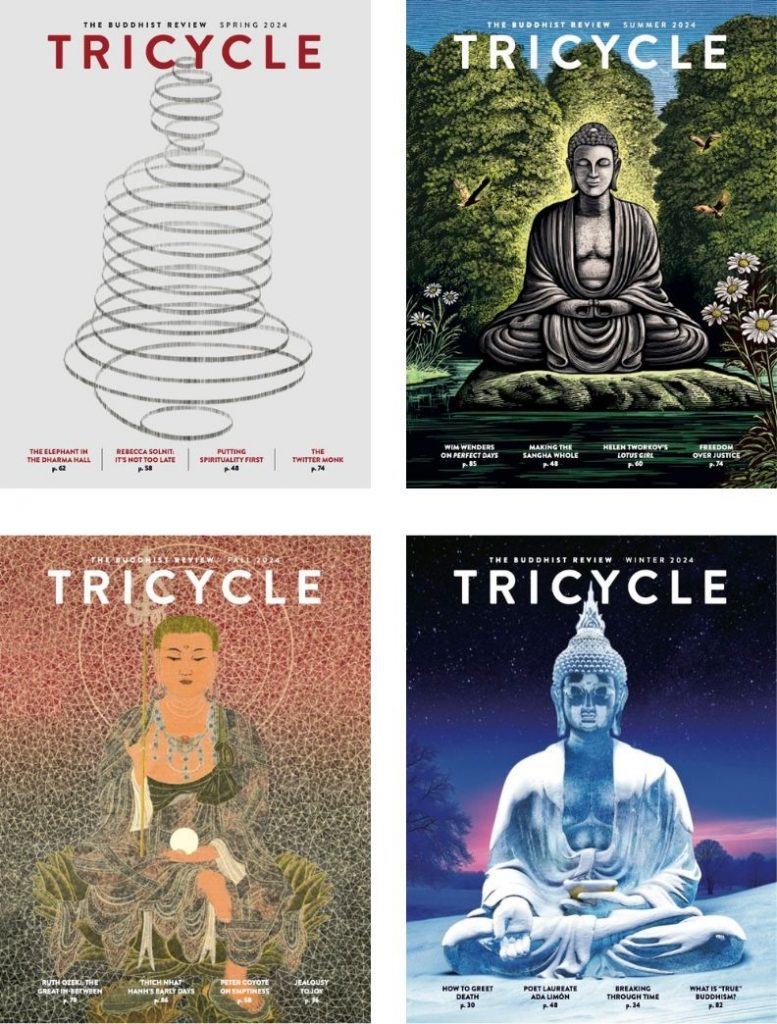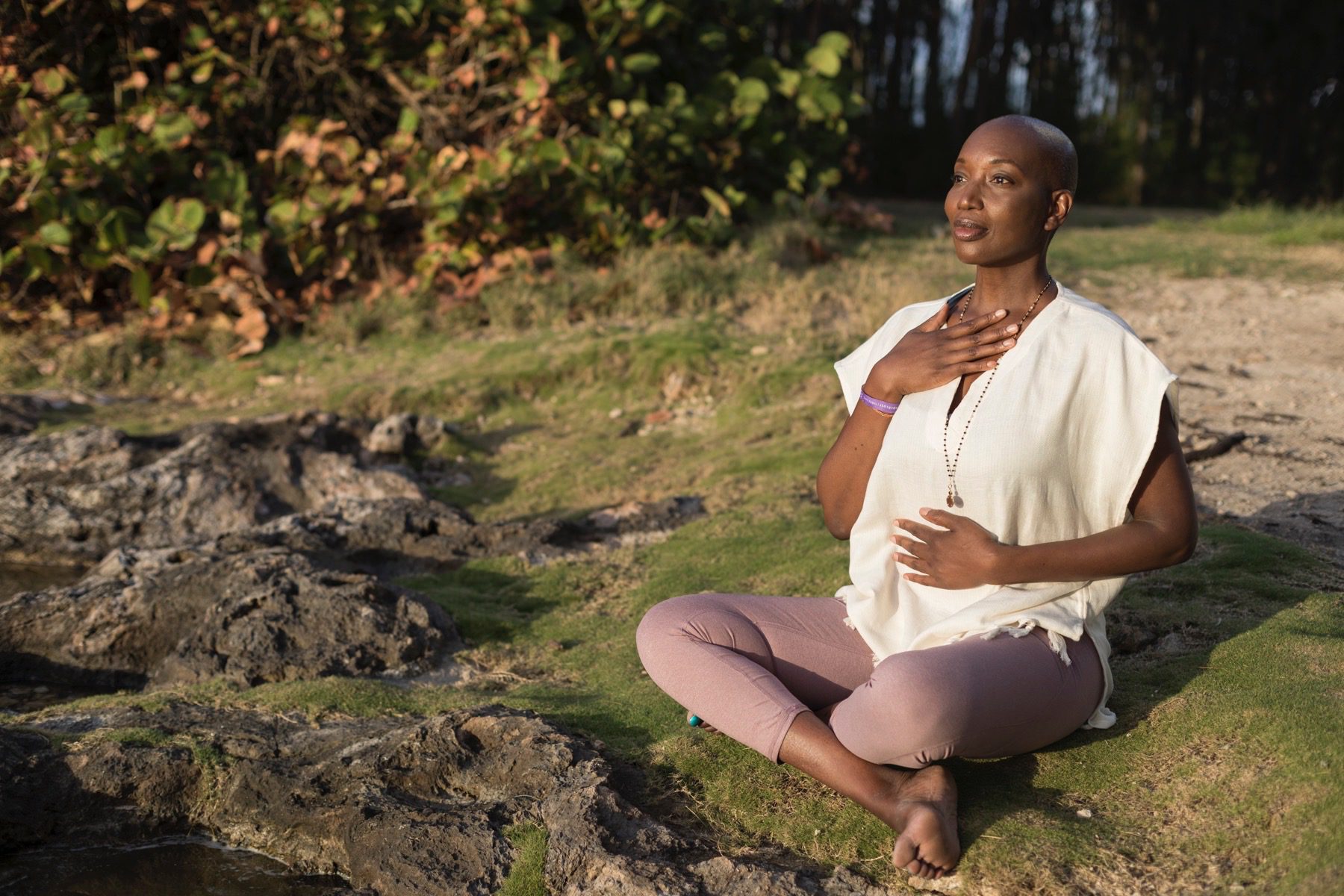Tricycle’s Top Articles of 2024
A collection of some of our favorite articles from the past year The post Tricycle’s Top Articles of 2024 first appeared on Tricycle: The Buddhist Review. The post Tricycle’s Top Articles of 2024 appeared first on Tricycle: The Buddhist...

A collection of some of our favorite articles from the past year
By The Editors Dec 09, 2024
Living with uncertainty is one of the hallmark experiences of being human. There are countless lessons throughout the canon and many Buddhist scriptures that speak to this exact feeling— how painful it is to be with the unknown, the unnecessary nature of its pain, and how the root cause of this specific type of suffering is none other than (you guessed it) clinging. Clinging to what we want the future to be like. Clinging to an idealized version of ourselves or the way we think our lives ought to be or even clinging to our projections of how we wish others would act. The sooner we let go of needing to know, of needing the world to be different, of needing ourselves to be different, the sooner we can begin the hard work of living our lives in the midst of this suffering, helping to enact change here and now.
Some of our favorite articles of the past year took on the pressing sociopolitical and environmental issues of the time head-on, while others chose to highlight the clarity that comes with devoting ourselves to a simpler kind of life. Some pieces questioned certain Buddhist rituals and protocols in light of the current moment while others looked back at some of the timeless teachings of Buddha ancestors. Yet in all of these pieces there exists the through line of approaching life’s problems in a different light, seeing every moment as a chance to practice, and embracing uncertainty directly and without fear.
Here are some of our favorite articles from 2024.
The Elephant in the Dharma HallIn the Spring 2024 issue, John Peacock takes to task Western Buddhism for its focus on individual flourishing while ignoring pressing sociopolitical and environmental issues. Drawing on Slovenian Marxist philosopher Slavoj Zizek’s critique of mindfulness as a Buddhist capitalist tool that doesn’t operate within its original enlightening intent, Peacock argues that contemporary Buddhism must move beyond personal practice and engage with systemic injustices like inequality, climate change, and exploitation. He calls for integrating sociopolitical critique and activism into Buddhist practice and spaces, emphasizing that ethics and politics are inseparable and central to the Buddha’s teaching. Wim Wenders on the Meaning of His New Film ‘Perfect Days’
Set in Tokyo, the film Perfect Days follows protagonist Hirayama, a middle-aged man (masterfully played by famed Japanese screen actor Koji Yakusho) who cleans public toilets for a living and leads a quiet but happy life doing so. But not all is as it appears. In an intimate interview with the film’s creator—acclaimed German director and cinephile favorite Wim Wenders—Tricycle contributor Tim Brinkof takes an invaluable look inside the mind of protagonist Hirayama and, simultaneously, Wenders himself. In just under six hundred words, Wenders shares an origin story for Hirayama, a biography he wrote specifically for Yakusho to be able to enter into the mind of his character. And what we are left with is something more than the sum of its parts—an exercise in narrative storytelling that continues the scope of the film’s vision to give way to further insights and perhaps to help you live your life a little more like Hirayama. Always Lie When Someone Asks if You Meditate
In our Summer 2024 issue, actor, author, storyteller, and self-professed theater kid from Queens Christopher Rivas tells the story of how he started meditating when caught in a lie, trying to spend time with a girl he was enamored with. Little did he know he was in for a life-changing silent retreat. “I started this practice to hang out with a cute girl, and I’ve since found all sorts of benefits: stress relief, calm, patience, peace. But that’s not why I keep sitting.” Whatever gets you there. The Sacred Polyester of Tibetan Khata
If you’ve ever been to a Tibetan Buddhist temple, you’ve most definitely encountered khata. Once made from wool, these highly symbolic textiles are now frequently made of polyester—and quickly polluting the planet. Tricycle contributor Karen Jensen spoke with Tibetan anthropologist and filmmaker Huatse Gyal about their various meanings, history, and the conundrum of religious waste. Toshiko Takaezu’s Hidden Worlds
When ceramist Toshiko Takaezu (1922–2011) was asked if she considered herself an artist, she responded that being an artist goes beyond the question of painting or making pots. “An artist is a poet in his or her own medium,” she answered. “And when an artist produces a good piece, that work has an unsaid quality; it contains a spirit and is alive. There’s a nebulous feeling in the piece that cannot be pinpointed in words.” This unsaid quality animated much of Takaezu’s work, and her installations often defied categorization, fusing traditional techniques with avant-garde aesthetics. Earlier this year, the Noguchi Museum held the largest retrospective of her work to date, “Toshiko Takaezu: Worlds Within.” In a review of the exhibition, Tricycle’s audio editor, Sarah Fleming, explores the intricate soundscapes hidden within Takaezu’s ceramic forms, her fascination with the 19th-century Buddhist nun Otagaki Rengetsu, and her wholehearted devotion to her craft. As Takaezu once told an interviewer, “If there is Zen in it, or whatever it is, it comes through if you enjoy doing your work. Anything you do with the best of your capacities is beautiful. . . Your whole body gets to be a part of everything, and you become free.” Not Empty, Not Full
In “Not Empty, Not Full” from our fall issue, longtime Buddhist journalist, author, and Tricycle contributing editor Katy Butler opens up about her lifelong struggle with food addiction, her Zen practices, the 12-Step community that helped bring relief, and how she came to find freedom in constraint. “I have bloomed in the 12-Step sangha the way a paper flower blooms in a glass of water,” Butler writes. “I feel more at home in my body. I listen to what it tells me. I pick up the phone when I’m lonely, drink water when I’m thirsty, and nap when I’m tired. And given where I started, it’s a miracle.” The Lost Robe
In the Spring 2024 issue of Tricycle, actor Michael O’Keefe explores what led him to leave the Zen priesthood. Weaving together memories of his relationships to his father and his Buddhist teacher, Bernie Glassman, O’Keefe delivers an eloquent account of what drew him to Zen, what he learned along the way, and, ultimately, why he had to renounce his vows in order to be true to himself. Read the full Tricycle article, and then listen to O’Keefe discuss his decision in a recent episode of Tricycle Talks. Finding a House of Your Own
In a particularly moving installment of her column “Between-States,” Tricycle contributor Ann Tashi Slater speaks with A House on Mango Street writer and poet Sandra Cisneros about feeling like Hokusai, the transformative power of loss, and using meditation to return to one’s roots. Rather than shy away from death, Cisneros talks about viewing death as an invaluable education in the experience of being human, saying that death gives individuals an opportunity to advance in their spiritual growth. Chock-full of wisdom, lyricism, and existential quotables, this piece was a favorite at the Tricycle office. The Generals Versus the Monks
Matthew Gindin, a journalist and former monk in the Thai Forest Tradition, offers an update to his 2023 Tricycle article on life for monastics under the rule of Myanmar’s military Junta dictatorship. From “turning the bowl” Saffron Revolution–style and facing imprisonment or death, to joining forces with the Junta, the 500,000-man sangha of Burmese monks contains a spectrum of reactions to the government in the three years following the coup. Gindin speaks with monks who describe the firsthand experience of navigating political conflict, protest, and Buddhist morals as Myanmar enters a “tailspin of deepening war and disintegration.” “The Generals Versus the Monks” is an important documentation of Buddhist history as it unfolds in front of us. Everything Is Buddha
For longtime Tricycle contributor Noelle Oxenhandler, aging and approaching death raises many existential concerns, and some very practical ones, namely, “What will happen to all my stuff?” Her essay for the Winter 2024 issue seeks to find an answer. In “Everything is Buddha,” Oxenhandler explores the inherently human nature of attachment to our belongings, sentimentality, and strategies for letting go. Case studies from her own collection include a rubber zebra in a sailor suit, a moose in plaid trousers, and stacks of books and CDs. Through contemplating the buddhanature of these objects, she arrives at the idea that “each of my belongings bears its own fate and will have its own journey once we are parted. Who knows what that journey will be?” Medicine as Benefit
“Medicine is a most powerful expression of love, of a giving heart.” Sowa Rigpa, or the “science of healing,” is a Tibetan medical and social system informed by Mahayana Buddhist principles and cosmologies. Dr. Nida Chenagtsang is a practitioner of Sowa Rigpa and Tibetan Buddhism, particularly in the ngakpa (nonmonastic) traditions rooted in Amdo, northeastern Tibet. Writer and Dartmouth anthropology professor Sienna Craig talks with Dr. Nida about his path into this work, its current orientations, and his visions for the future of Tibetan healing. The Noble Truth of Pain
Soto Zen priest Annalisa Rakugo Castaldo shares insights on the value of being present with physical suffering. Rakugo, who lives with chronic pain, describes how integrating attention to pain in her Zen practice has reoriented her relationship with it entirely. “Pain is a friend, a good friend. Just as it is only our closest friends who will tell us hard truths, pain is there to make sure we pay attention.” Aside from serving as a Zen priest with Soji Zen Center, Rakugo is also the cocreator of SZBA’s Priests with Disabilities affinity group and an English professor at Widener University in Chester, Pennsylvania, which comes across in her dynamic prose. In a separate interview with Tricycle’s web editorial assistant Pema Tashi, Rakugo expands on the intersections of where Zen and disability meet. Where the Light Comes From
In her role as the 24th Poet Laureate of the United States, Ada Limón has undertaken a series of projects harnessing poetry to transform our relationship to the natural world, from installing poems on picnic benches in national parks to writing a poem that was sent to the second moon of Jupiter. In all of these projects, Limón is guided by the view that poetry, much like meditative practice, can be an offering. “I’m interested in the way that as writers we can think of our work as offerings, as things that go out in the world and do work beyond us,” she told Tricycle. “When I think of loving-kindness as an offering that spirals outward, I think that poems can do that too.” In an excerpt from a recent episode of Tricycle Talks, Limón discusses how poems can slow us down and return us to the present moment, her practice of loving-kindness and how it influences her writing, and the role of witnessing and being witnessed. Free from Suffering and Free to Suffer
Prompted by the death of his mother, a Colombian Zen monk reflects on a timeless teaching imparted by Bodhidharma, the founder of Chan Buddhism in China. In processing his grief, Santiago Santai Jiménez takes in a powerful lesson on emptiness, recounting, “It is easy to get attached to any insight we have, especially if it is a profound one, but to be truly free, we must also let go of even our most precious realizations.” ‘Each Moment Is a Miracle’
At 90 years old, acclaimed calligrapher and translator Kazuaki Tanahashi has an incredibly storied career, from pursuing a youthful fascination of the near impenetrable works of Eihei Dogen to expanding on the masterpieces of East Asian calligraphy. As a peaceworker and environmental activist, Tanahashi is also no stranger to embracing uncertainty and facing off against seemingly surmountable odds, attributing his fearlessness to his lifelong aikido practice. “It’s nondual: There is no enemy,” he reflects. “Your enemy is a friend you need to protect.” Read Sarah Fleming’s full profile on the prolific polymath. On Ajaan Lee’s ‘Keeping the Breath in Mind’
While raised on Long Island, the teachings of venerated Theravada monk Thānissaro Bhikkhu come from a long lineage of Thai masters of the Forest Tradition (Pali: kammatthana). In the first edition of Tricycle’s series “Reading as Praxis,” Thānissaro Bhikkhu recounts how he was first introduced to Ajaan Lee’s seminal meditation guide Keeping the Breath in Mind, while studying under the tutelage of late Ajaan Fuang and how the instructions there within helped him to progress in his meditative practice for decades to come. Zen in the Age of Layoffs
Spurred by being laid off from her tech startup job and feeling adrift, writer Daisy Lin decides to spontaneously join her sister and brother-in-law on their upcoming trip to Japan. Part vacation, part spiritual pilgrimage, Lin begins to see her own struggles as a continuation of that of her ancestors, calling upon their self-determination and resilience in the face of patriarchy and adversity. In an ode to the disillusionment that occurs while living through uncertainty, Lin writes, “unbound, I felt connected to all those who had forged new paths before me when old ones closed.” Everyone Wants to Save the World, but No One Wants to Help Mom Do the Dishes
In a piece from our Fall issue, contributor Mark Van Buren shows us that the opportunity to practice compassion is right in front of us. “With a sense of care and immediacy, do the next right thing,” Van Buren says. “When you’re done eating, wash the dishes. When you have to go to work, get in your car and drive safely. When you find starfish washed up on the shore, throw them back into the ocean. When you see someone who is suffering, try to ease it.”
![]()
Thank you for subscribing to Tricycle! As a nonprofit, we depend on readers like you to keep Buddhist teachings and practices widely available.

 ValVades
ValVades 























.jpg&h=630&w=1200&q=100&v=f776164e2b&c=1)








